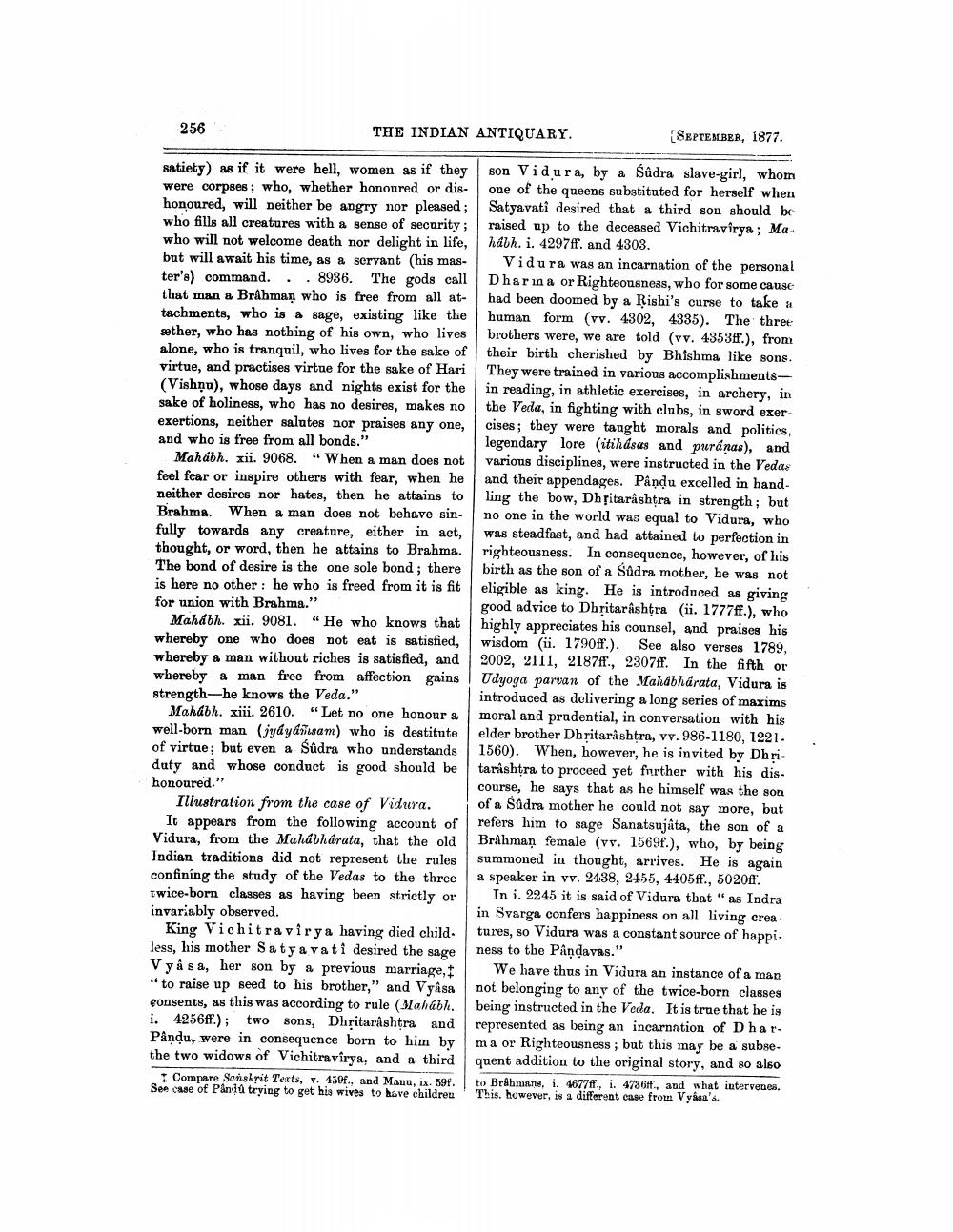________________
256
THE INDIAN ANTIQUARY.
SEPTEMBER, 1877.
satiety) as if it were hell, women as if they were corpses; who, whether honoured or dishonoured, will neither be angry nor pleased ; who fills all creatures with a sense of security; who will not welcome death nor delight in life, but will await his time, as a servant (his master's) command... 8936. The gods call that man a Brahman who is free from all attachments, who is a sage, existing like the æther, who has nothing of his own, who lives alone, who is tranquil, who lives for the sake of virtue, and practises virtue for the sake of Hari (Vishņu), whose days and nights exist for the sake of holiness, who has no desires, makes no exertions, neither salutes nor praises any one, and who is free from all bonds."
Mahábh. xii. 9068. “When a man does not feel fear or inspire others with fear, when he neither desires nor hates, then he attains to Brahma. When a man does not behave sin. fully towards any creature, either in act, thought, or word, then he attains to Brahma. The bond of desire is the one sole bond; there is here no other : he who is freed from it is fit for union with Brahma."
Mahabh. xii. 9081. "He who knows that whereby one who does not eat is satisfied, whereby a man without riches is satisfied, and whereby a man free from affection gains strength-he knows the Veda."
Mahábh. xiii. 2610. "Let no one honour a well-born man (jyáyá sam) who is destitute of virtue; but even a Sûdra who understands duty and whose conduct is good should be honoured."
Illustration from the case of Vidura. It appears from the following account of Vidura, from the Mahabharata, that the old Indian traditions did not represent the rules confining the study of the Vedas to the three twice-born classes as having been strictly or invariably observed.
King Vichitravirya having died child. less, his mother Satya vati desired the sage V ya sa, her son by a previous marriage, t "to raise up seed to his brother," and Vyasa consents, as this was according to rule (Mahabh. i. 4256ff.); two sons, Dhritarashtra and Pându, were in consequence born to him by the two widows of Vichitravirya, and a third
I Compare Sanskrit Tects, s. 459f., and Manu, ix. 594. See case of Panvid trying to get his wives to have childreu
son Vidu ra, by a Sûdra slave-girl, whom one of the queens substituted for herself when Satyavatî desired that a third sou should be raised up to the deceased Vichitravirya ; Ma. hábh. i. 4297ff. and 4303.
Vidura was an incarnation of the personal Dharina or Righteousness, who for some cause had been doomed by a Rishi's curse to take a human form (vv. 4302, 4335). The three brothers were, we are told (vv. 4353ff.), from their birth cherished by Bhishma like sons. They were trained in various accomplishments in reading, in athletic exercises, in archery, in the Veda, in fighting with clubs, in sword exercises; they were taught morals and polities, legendary lore (itihúsas and puranas), and various disciplines, were instructed in the Vedas and their appendages. Pându excelled in handling the bow, Dhțitarashtra in strength; but no one in the world was equal to Vidura, who was steadfast, and had attained to perfection in righteousness. In consequence, however, of his birth as the son of a Sûdra mother, he was not eligible as king. He is introduced as giving good advice to Dhritarashtra (ii. 1777ff.), who highly appreciates his counsel, and praises his wisdom (ii. 1790ff.). See also verses 1789, 2002, 2111, 2187ff., 2307ff. In the fifth or Udyoga parvan of the Mahabharata, Vidura is introduced as delivering a long series of maxims moral and prudential, in conversation with his elder brother Dhritarashtra, vv.986-1180, 1221. 1560). When, however, he is invited by Dhri. tarashtra to proceed yet further with his discourse, he says that as he himself was the son of a Sadra mother he could not say more, but refers him to sage Sanatsujata, the son of a Brahman female (vv. 1569.), who, by being summoned in thought, arrives. He is again a speaker in vv. 2438, 2455, 4405ff., 5020ff.
In i. 2245 it is said of Vidura that "as Indra in Svarga confers happiness on all living crea. tures, so Vidura was a constant source of happi. ness to the Pandavas."
We have thus in Vidura an instance of a man not belonging to any of the twice-born classes being instructod in the Veda. It is true that he is represented as being an incarnntion of Dhar. ma or Righteousness; but this may be a subse. quent addition to the original story, and so also to Brahmans, i. 1677ff., i. 4736ft, and what intervenes, This, however, is a different case from Vyasa's.




